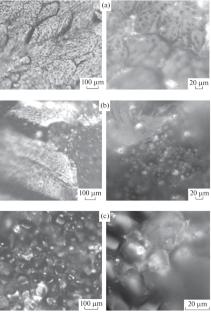Influence of Polysulfone Modifier on Impact Strength of Epoxy Resin at Low Temperatures
IF 0.3
Q4 MATERIALS SCIENCE, MULTIDISCIPLINARY
引用次数: 0
Abstract
The effect of polysulfone PSF-150 on the impact strength of epoxy resin ED-20 in the temperature range from –60 to +20°C was studied. It was shown that the epoxy resin modified with polysulfone has increased impact strength and retains an advantage over the unmodified one in the entire range of test temperatures. The system with a phase structure containing a continuous phase of thermoplastic makes a significant contribution to increasing the impact strength of the modified matrix.

聚砜改性剂对环氧树脂低温冲击强度的影响
研究了聚砜PSF-150对环氧树脂ED-20在-60 ~ +20℃范围内冲击强度的影响。结果表明,经聚砜改性的环氧树脂在整个试验温度范围内,其冲击强度均高于未改性的环氧树脂。含有连续相热塑性塑料的相结构体系对提高改性基体的冲击强度有显著贡献。
本文章由计算机程序翻译,如有差异,请以英文原文为准。
求助全文
约1分钟内获得全文
求助全文
来源期刊

Inorganic Materials: Applied Research
Engineering-Engineering (all)
CiteScore
0.90
自引率
0.00%
发文量
199
期刊介绍:
Inorganic Materials: Applied Research contains translations of research articles devoted to applied aspects of inorganic materials. Best articles are selected from four Russian periodicals: Materialovedenie, Perspektivnye Materialy, Fizika i Khimiya Obrabotki Materialov, and Voprosy Materialovedeniya and translated into English. The journal reports recent achievements in materials science: physical and chemical bases of materials science; effects of synergism in composite materials; computer simulations; creation of new materials (including carbon-based materials and ceramics, semiconductors, superconductors, composite materials, polymers, materials for nuclear engineering, materials for aircraft and space engineering, materials for quantum electronics, materials for electronics and optoelectronics, materials for nuclear and thermonuclear power engineering, radiation-hardened materials, materials for use in medicine, etc.); analytical techniques; structure–property relationships; nanostructures and nanotechnologies; advanced technologies; use of hydrogen in structural materials; and economic and environmental issues. The journal also considers engineering issues of materials processing with plasma, high-gradient crystallization, laser technology, and ultrasonic technology. Currently the journal does not accept direct submissions, but submissions to one of the source journals is possible.
 求助内容:
求助内容: 应助结果提醒方式:
应助结果提醒方式:


